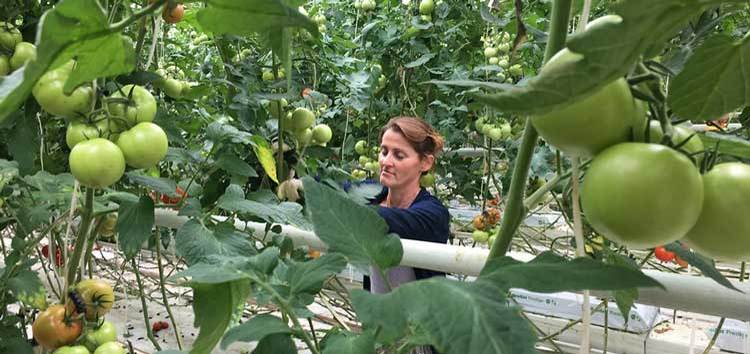
Mornings resemble a well-rehearsed choreography performance at the Imereti Greenery, a greenhouse nestled in the small city of Samtredia, western Georgia. Two groups of workers at opposite ends of a large water basin plant and harvest lettuce with perfect synchrony. The Imereti Greenery does not look like a typical greenhouse in the morning, or at any other time of the day: lettuce, tomatoes and cucumbers are grown in water here.
”Hydroponic farming is a modern method of agriculture where crops are cultivated without soil by using mineral nutrients in a water solvent,” says Natia Khelaia, general manager of the Imereti Greenery. “In Georgia, local farmers generally rely on traditional agricultural methods. Hydroponic farming is a relatively recent trend here, although it’s already widely used in Europe.”
The Imereti Greenery was set up in 2014 by entrepreneurs from Georgia and the Netherlands. Their aim was to produce high quality Georgian vegetables for the local market by employing the latest technologies in agriculture.
“There is a myriad of reasons why we decided to go with hydroponic farming,” explains Natia Khelaia. “First of all, growing crops requires far less water than traditional methods. We are in control of the whole growing process since we can monitor each crop’s temperature and state. Lastly, we can achieve higher yields all year long.”
Fresh vegetables, healthy customers
Georgia has a longstanding tradition of agriculture thanks to its climate and fertile soil. Around 40 per cent of the Georgian population now live in rural areas, and a similar percentage of the workforce is employed in agriculture. And yet, this sector accounts for only around 8 per cent of the GDP.
Georgia signed an association agreement with the European Union and established a free trade area with the EU market. This opened up the world’s largest trading block, with its hundreds of millions of consumers, to Georgia’s goods – agricultural produce included.
A flagship programme of the EBRD and the EU not only helps companies to fully realise their trading potential, but also to foster production to suit local needs. The initiative is regional, covering three countries: Georgia, Moldova and Ukraine – all beneficiaries of the free trade areas with the EU. The programme targets small and medium-sized enterprises, providing access to the financing necessary to expand, modernise their equipment, foster workplace safety practices and upgrade sanitary conditions: all requirements to compete on the EU market.
For the Imereti Greenery, the first step following its establishment was to substitute imports with locally grown crops. But, to grow more vegetables and satisfy local needs, the company needed to grow too. Through the EU4Business-EBRD Credit Line, the company received financing to enlarge its greenhouse and purchase equipment. The investment was complemented by an EU grant of up to 15 per cent of the loan and technical assistance engaging local and international expertise.
This financing and support allowed the company to promote sustainable farming, boost production, and bring fresh vegetables and consumers closer together. But that’s not all.
‘’We are proud that we are generating job opportunities for the locals of the region. Regional development is critical for our country. Each new job can make a real difference to the lives of one, two and maybe even more families,’’ adds Natia Khelaia.
